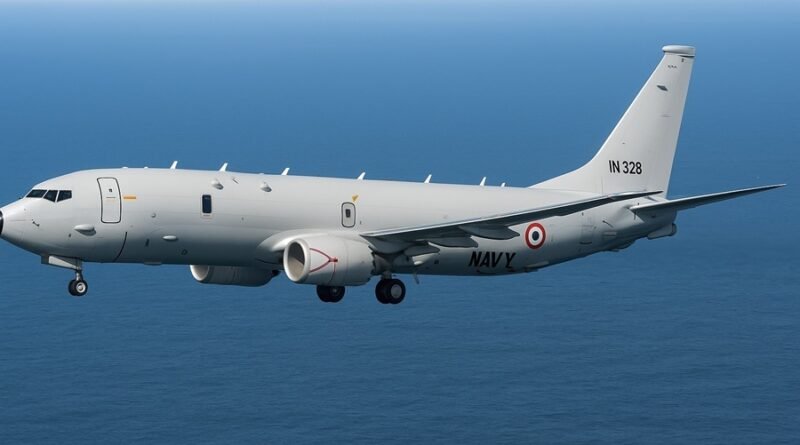P-8I Aircraft: Maritime Patrol Powerhouse & India’s Strategic Asset
Introduction
The P-8I aircraft, a customized variant of the P-8A Poseidon, is a state-of-the-art maritime patrol aircraft developed by Boeing. Designed for long-range anti-submarine warfare (ASW), anti-surface warfare (ASuW), intelligence, surveillance, and reconnaissance (ISR), the P-8 series is at the heart of modern naval operations. While the P-8A is used by the U.S. Navy and allied forces, the P-8I has been specifically tailored for the needs of the Indian Navy, marking a significant leap in India’s maritime surveillance and strike capability.
Overview of the P-8 Poseidon Platform
Origins and Development
The P-8 Poseidon is based on the Boeing 737-800ERX commercial airframe. Its development began in the early 2000s as a replacement for the aging P-3C Orion. The aircraft was engineered for high-speed, high-altitude performance, extended endurance, and multi-mission flexibility over oceans and littoral zones.
Key Features
- Airframe: Modified Boeing 737 with reinforced structure and raked wingtips
- Engines: 2 × CFM56-7B27A turbofan engines
- Speed: 789 km/h (490 mph)
- Range: Over 2,200 km with 4 hours on station
- Service Ceiling: 41,000 ft
- Crew: Typically 9 (2 pilots + 7 mission crew)
Read This: AWACS Aircraft: The Eyes in the Sky
Mission Capabilities
1. Anti-Submarine Warfare (ASW)
Equipped with advanced sonobuoys, magnetic anomaly detectors (MAD), and torpedoes, the P-8 excels at tracking and neutralizing submarines. It plays a key role in denying adversaries the underwater advantage.
2. Anti-Surface Warfare (ASuW)
The aircraft can carry Harpoon anti-ship missiles and relay targeting data to other platforms, making it a vital node in surface engagement strategies.
3. Intelligence, Surveillance, Reconnaissance (ISR)
Using AESA radar, EO/IR sensors, and SIGINT equipment, the P-8I gathers real-time intelligence over vast maritime expanses, aiding decision-making and situational awareness.
4. Search and Rescue (SAR)
It can assist in humanitarian missions and disaster response, providing long-range aerial coverage and coordination capabilities.
Avionics and Systems
- AN/APY-10 radar for all-weather targeting
- MX-20 EO/IR sensor turret
- ALR-95 radar warning receivers
- Data links for real-time information sharing with naval assets
- Magnetic Anomaly Detector (MAD) on the P-8I (not present on P-8A)
Weapons Payload
- Internal Bomb Bay: Can carry Mark 54 lightweight torpedoes
- Underwing Hardpoints: Capable of deploying Harpoon Block II missiles
- Total Hardpoints: 11 (5 internal + 6 underwing)
- Can also carry depth charges, mines, and free-fall bombs
Global Operators
The P-8A is used by several allied countries:
- United States Navy – Largest fleet operator
- Royal Australian Air Force (RAAF)
- Royal Air Force (UK)
- Royal Norwegian Air Force
- Royal New Zealand Air Force
- Republic of Korea Navy
- German Navy
P-8I Poseidon: The Indian Variant
Customized for India
The P-8I is the export variant developed specifically for the Indian Navy. It was the first international customer of the P-8 platform, with India signing a $2.1 billion contract in 2009 for 8 aircraft, followed by a follow-up order for 4 more.
Key Indian-Specific Features
- Telephonics APS-143 OceanEye Radar (additional to AN/APY-10)
- MAGNETOMETER for submarine detection
- Data link capability to network with Indian naval command
- Indigenous IFF (Identification Friend or Foe) transponders and Databases
- Bharat Electronics Limited (BEL) and DRDO systems integration
Indian Fleet Size and Bases
- Total Acquired: 12 P-8Is as of 2023
- Operational Bases:
- INS Rajali (Arakkonam, Tamil Nadu) – Eastern Naval Command
- INS Hansa (Goa) – Western Naval Command
Strategic Impact
1. Indian Ocean Surveillance
With growing Chinese naval presence in the Indian Ocean Region (IOR), the P-8I gives India eyes over vast oceanic swaths. These aircraft routinely monitor Chinese submarines and vessels.
2. Doklam and LAC Operations
During border tensions with China in 2020, the Indian Navy deployed P-8Is over the Himalayas, showcasing their land surveillance capability — a less publicized but potent role.
3. Interoperability with QUAD
India’s P-8Is are interoperable with U.S., Australian, and Japanese platforms, playing a key role in QUAD naval exercises like Malabar.
4. Disaster Relief and Search Missions
The Indian Navy has deployed P-8Is for search operations including missing aircraft, natural disaster zones, and piracy patrols.
Modernization and Future Prospects
India is expected to seek additional upgrades, such as:
- Enhanced AI-based data fusion
- Integration with Indian UAVs and satellites
- Upgraded electronic warfare (EW) suites
- Possible expansion beyond 12 units
Boeing also supports the P-8I fleet in India via performance-based logistics (PBL) and training partnerships with HAL and other local firms.
Comparisons with Other Platforms
| Feature | P-8I Poseidon | P-3C Orion | Il-38SD (Russia) |
|---|---|---|---|
| Airframe | Boeing 737 | Lockheed Electra | Ilyushin Il-38 |
| Max Speed (km/h) | 789 | 750 | 650 |
| Range (km) | 2,200+ | 1,350 | 2,200 |
| ASW Sensors | Advanced | Basic | Mid-range |
| Network Capability | High | Low | Moderate |
Explore:
- Chengdu J-20 and Shenyang J-35 vs F-35 Lightning II
- JF-17 Thunder vs Rafale: Comparing Two Modern Fighters from Different Leagues
- F-16 vs Rafale: A Detailed Comparison of Two Iconic Fighter Jets
- F-35 vs Sukhoi Su-57: A Comprehensive Comparison of Fifth-Generation Stealth Fighters
- F-16 vs Tejas LCA: Detailed Comparison of Two Modern Fighter Jets
Conclusion
The P-8I Poseidon is a cornerstone of India’s maritime security strategy, offering unmatched capabilities in submarine hunting, surface warfare, and ISR. As tensions in the Indo-Pacific rise and the underwater domain becomes more contested, India’s investment in P-8Is enhances not only its own naval reach but also its contribution to regional stability and allied cooperation.

